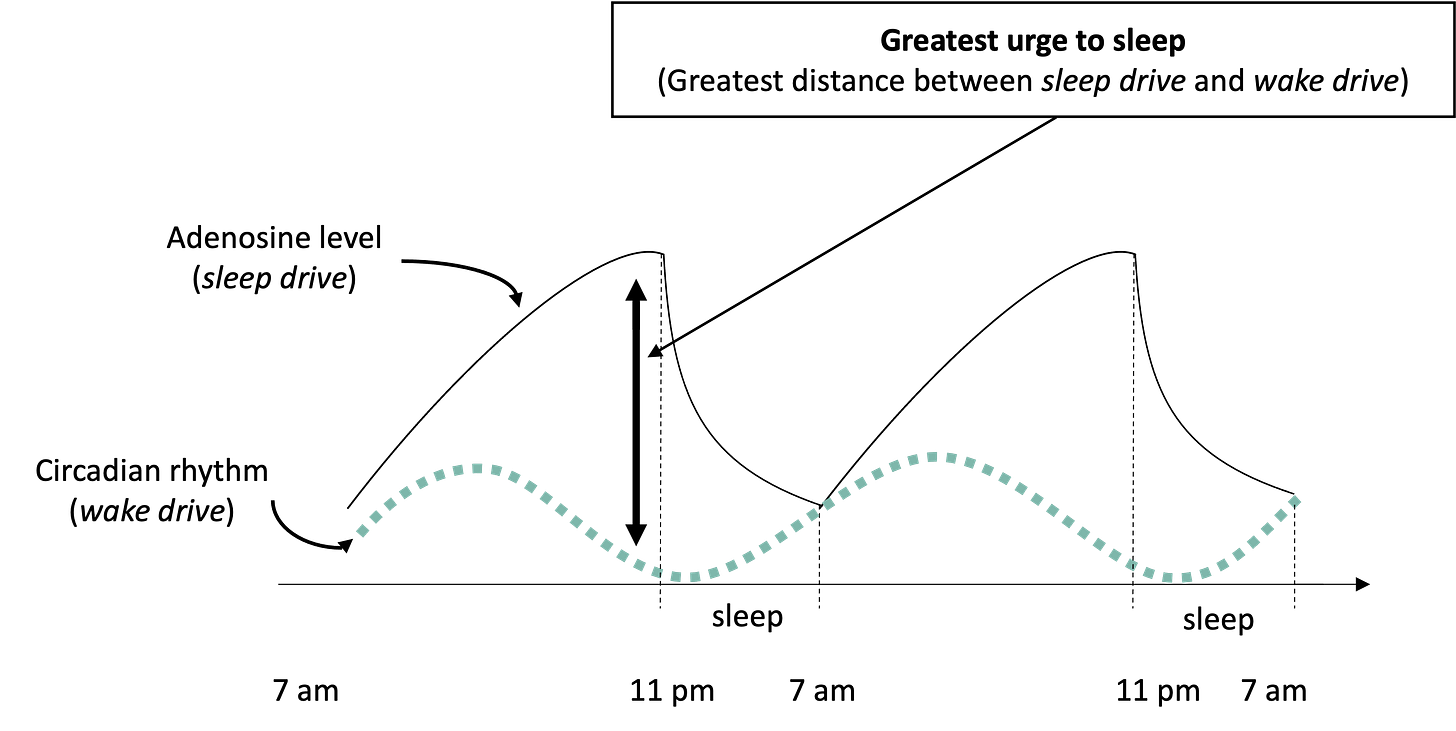Caffeine can make your afternoon crash worse and your sleep less deep. But if you're timing it right, it can also do the reverse.
From the moment we wake up and throughout the day, a chemical called adenosine builds up in the brain. The level of this chemical drives our so-called sleep pressure. In a nutshell, adenosine tells the brain when to be tired.
As I’ve described in the last weeks, our twenty-four-hour circadian rhythm is mainly driven by how we view light throughout the day – while the timing of exercise and eating also matters. Yet, the circadian rhythm is only one of two factors determining our wake and sleep. As it turns out, the second factor is our adenosine level.
When we've been awake for some 15 hours in the evening, a declining circadian rhythm (or wake drive) ideally meets a high adenosine level (or sleep drive). This figure from Why We Sleep provides an overview of how the two factors develop over the day:
At the end of the day (pun intended), a good night of (deep) sleep allows us to get rid of most of that adenosine – and to wake up feeling well-rested and alert the following day.
Let’s return to caffeine. It works by occupying the adenosine receptors in the brain. Put differently, caffeine prevents adenosine from communicating its sleepiness signal. As a result, it tricks the brain into feeling alert and awake, even if there is a high level of adenosine that would otherwise make us sleepy.
Consumed from dawn to dusk, caffeine messes up our adenosine system. Here's why – and how to avoid just that by using caffeine strategically throughout the day.
1) To prevent worsening your afternoon crash, avoid caffeine in the first 90 minutes after waking
Although caffeine occupies the adenosine receptors in your brain, the sleepiness chemical continues to build up while that’s happening. Once the caffeine is decomposed, you'll experience a massive surge in sleepiness driven by the release of all of that extra adenosine. As Matthew Walker writes in "Why We Sleep": "When this happens, you are assaulted with a most forceful adenosine-trigger urge to sleep”. However, there's a simple remedy that I first learned about from Andrew Huberman: By avoiding caffeine in the first 90 minutes after waking, you'll get sleepy in the evening instead of the afternoon.
2) To optimize for deep sleep at night, stay away from caffeine after 3 pm
Unlike in the afternoon, high levels of adenosine are precisely what we need in the evening to get 90 minutes of deep sleep. Together with your decreasing circadian rhythm, this creates the greatest urge to sleep throughout the day – which is reflected in the long vertical double arrow in the figure. Consuming caffeine in the later afternoon or evening will take away your sleep pressure exactly when you need it most – and reliably prevent you from getting the deep sleep you need in the first half of the night. Since caffeine has a half-life of 5-7 hours, sleep scientists recommend avoiding it at least 8 hours before bed. If you go to bed at 11 pm, that’s 3 pm.
On top of timing, quantity matters. According to the Mayo Clinic, up to 400 mg of caffeine a day is safe for most healthy adults. That's the equivalent of two to four cups of coffee, depending on the size and strength.
Lastly, decaf coffee is a good option if you really can't go without caffeine in the early morning or late afternoon. However, don't overdo it. "One cup of decaf usually contains 15 to 30 percent of the dose of a regular cup of coffee, which is far from caffeine-free", as Walker points out. "Should you drink three to four cups of decaf in the evening, it is just as damaging to your sleep as one regular cup of coffee."
Here's another challenge: Consume caffeine strategically by timing it right for the next three days. You'll be amazed about what that does to your alertness in the afternoon and sleep at night.
And if you liked this post, please share it with others.
Until next week,
Christian






Thanks Christian, as always very helpful content!